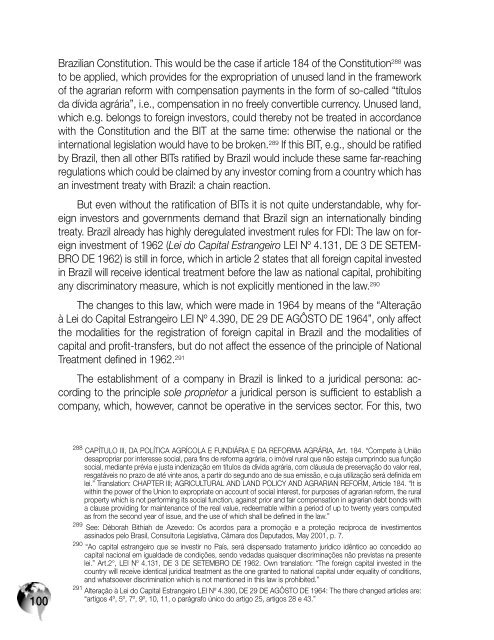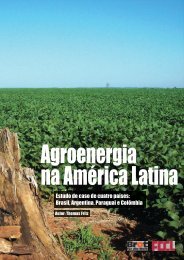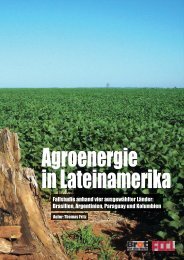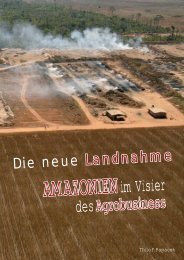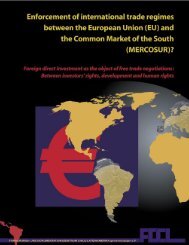Download - FDCL
Download - FDCL
Download - FDCL
You also want an ePaper? Increase the reach of your titles
YUMPU automatically turns print PDFs into web optimized ePapers that Google loves.
100<br />
Brazilian Constitution. This would be the case if article 184 of the Constitution 288 was<br />
to be applied, which provides for the expropriation of unused land in the framework<br />
of the agrarian reform with compensation payments in the form of so-called “títulos<br />
da dívida agrária”, i.e., compensation in no freely convertible currency. Unused land,<br />
which e.g. belongs to foreign investors, could thereby not be treated in accordance<br />
with the Constitution and the BIT at the same time: otherwise the national or the<br />
international legislation would have to be broken. 289 If this BIT, e.g., should be ratified<br />
by Brazil, then all other BITs ratified by Brazil would include these same far-reaching<br />
regulations which could be claimed by any investor coming from a country which has<br />
an investment treaty with Brazil: a chain reaction.<br />
But even without the ratification of BITs it is not quite understandable, why foreign<br />
investors and governments demand that Brazil sign an internationally binding<br />
treaty. Brazil already has highly deregulated investment rules for FDI: The law on foreign<br />
investment of 1962 (Lei do Capital Estrangeiro LEI Nº 4.131, DE 3 DE SETEM-<br />
BRO DE 1962) is still in force, which in article 2 states that all foreign capital invested<br />
in Brazil will receive identical treatment before the law as national capital, prohibiting<br />
any discriminatory measure, which is not explicitly mentioned in the law. 290<br />
The changes to this law, which were made in 1964 by means of the “Alteração<br />
à Lei do Capital Estrangeiro LEI Nº 4.390, DE 29 DE AGÔSTO DE 1964”, only affect<br />
the modalities for the registration of foreign capital in Brazil and the modalities of<br />
capital and profit-transfers, but do not affect the essence of the principle of National<br />
Treatment defined in 1962. 291<br />
The establishment of a company in Brazil is linked to a juridical persona: according<br />
to the principle sole proprietor a juridical person is sufficient to establish a<br />
company, which, however, cannot be operative in the services sector. For this, two<br />
288 CAPÍTULO III, DA POLÍTICA AGRÍCOLA E FUNDIÁRIA E DA REFORMA AGRÁRIA, Art. 184. “Compete à União<br />
desapropriar por interesse social, para fins de reforma agrária, o imóvel rural que não esteja cumprindo sua função<br />
social, mediante prévia e justa indenização em títulos da dívida agrária, com cláusula de preservação do valor real,<br />
resgatáveis no prazo de até vinte anos, a partir do segundo ano de sua emissão, e cuja utilização será definida em<br />
lei.” Translation: CHAPTER III; AGRICULTURAL AND LAND POLICY AND AGRARIAN REFORM, Article 184. “It is<br />
within the power of the Union to expropriate on account of social interest, for purposes of agrarian reform, the rural<br />
property which is not performing its social function, against prior and fair compensation in agrarian debt bonds with<br />
a clause providing for maintenance of the real value, redeemable within a period of up to twenty years computed<br />
as from the second year of issue, and the use of which shall be defined in the law.”<br />
289 See: Déborah Bithiah de Azevedo: Os acordos para a promoção e a proteção recíproca de investimentos<br />
assinados pelo Brasil, Consultoria Legislativa, Câmara dos Deputados, May 2001, p. 7.<br />
290 “Ao capital estrangeiro que se investir no País, será dispensado tratamento jurídico idêntico ao concedido ao<br />
capital nacional em igualdade de condições, sendo vedadas quaisquer discriminações não previstas na presente<br />
lei.” Art.2°, LEI Nº 4.131, DE 3 DE SETEMBRO DE 1962. Own translation: “The foreign capital invested in the<br />
country will receive identical juridical treatment as the one granted to national capital under equality of conditions,<br />
and whatsoever discrimination which is not mentioned in this law is prohibited.”<br />
291 Alteração à Lei do Capital Estrangeiro LEI Nº 4.390, DE 29 DE AGÔSTO DE 1964: The there changed articles are:<br />
“artigos 4º, 5º, 7º, 9º, 10, 11, o parágrafo único do artigo 25, artigos 28 e 43.”


